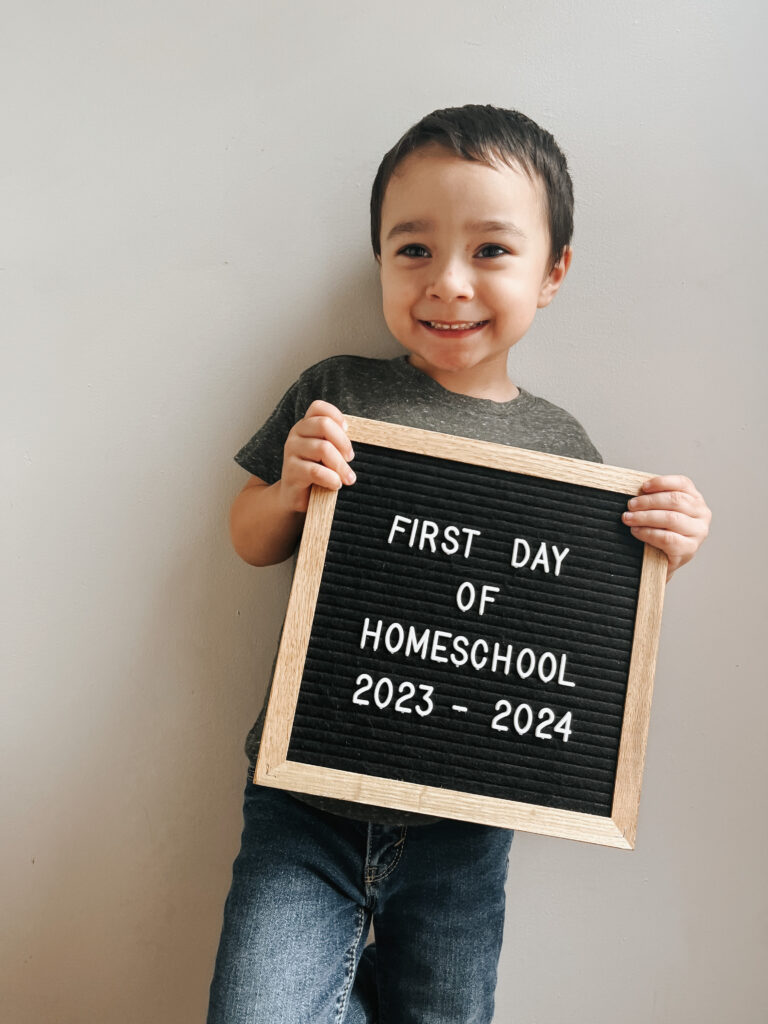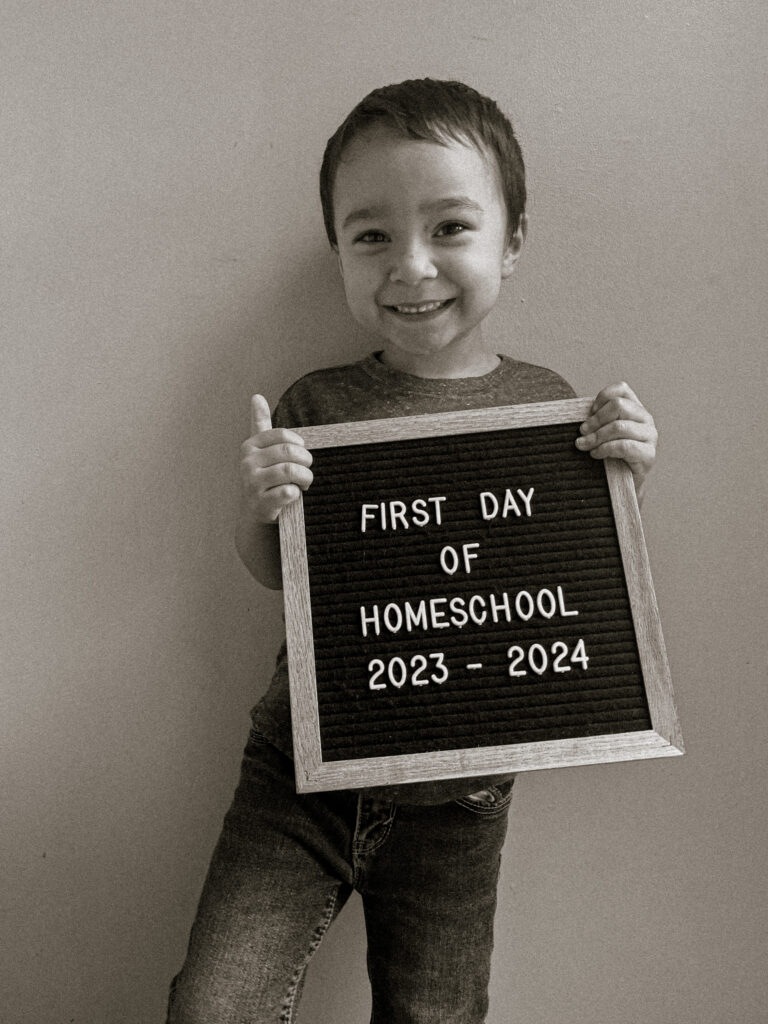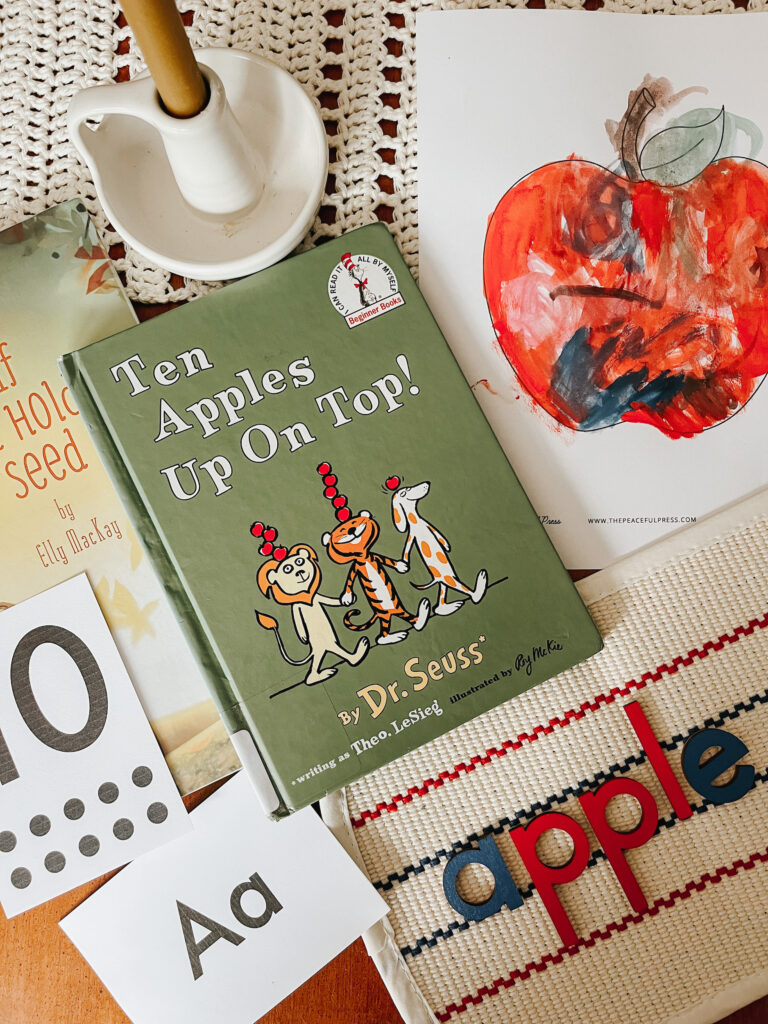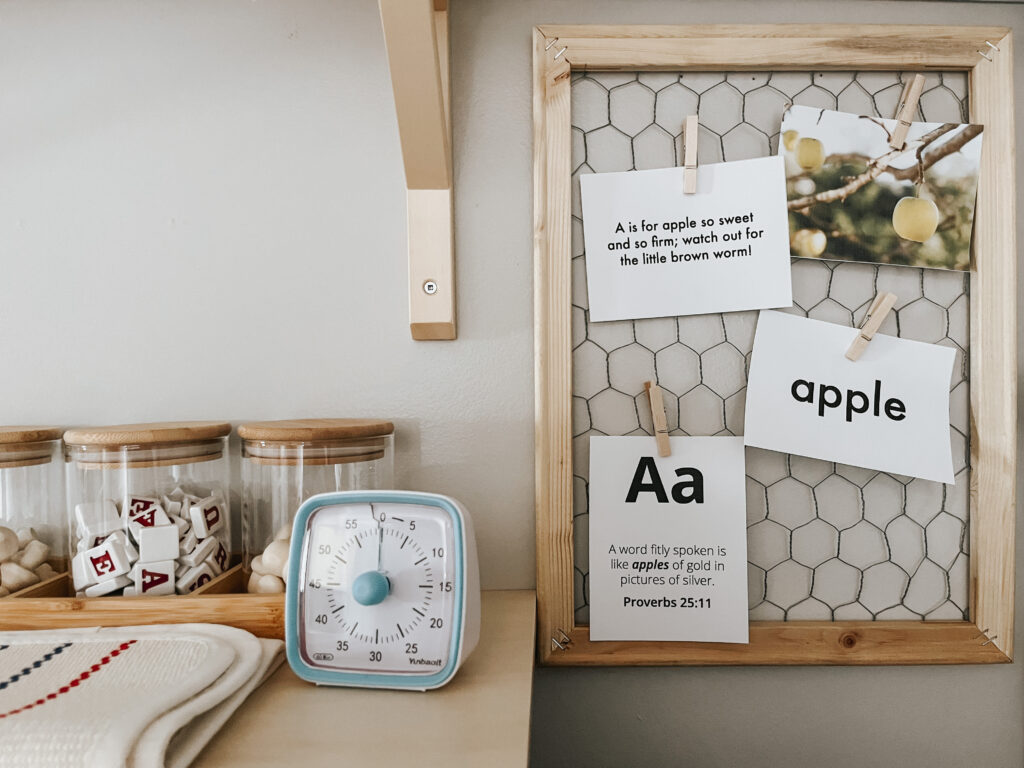Our sweet four-year-old loves to learn. He’s always had a strong interest in books, numbers, and learning how things work. As a former teacher, I understand the importance of a slow growing period during the early years. When children are forced into a formal educational setting at such a young age, I truly believe they miss out on very important developments that happen during those years with a caretaker.
In the early years, I believe it is vital to have a gentle growing time which includes independent & imaginative play, read alouds, and spending time outdoors. It’s also a priority for me to establish good rhythms for our family to structure our days. Children are more than capable to learn good personal habits such as choosing their clothing for the day, combing their hair, and brushing their teeth, as well as helping with household chores. These habits are great for children because they not only gain independence by completing tasks on their own, but they also learn what it means to contribute to the household.
While I believe that four is young to begin “formal” lessons, I also know that each child is different and I have been very careful to look for readiness signs in Samuel as he’s reached this age. He has been eager to learn for a full year now and knows his numbers, letters, some letter sounds, and can skip count by 2s, 5s, and 10s with confidence. These things were learned simply from his own interest and desire to grasp the concepts. I think it’s been very beneficial for him to learn and hit those milestones at his own pace. Because of his desire to learn, we felt that beginning a more structured (while still laid-back) approach to Samuel’s education this year would be timely.
This school year, we are focusing on three main areas: habit training, hands-on & practical learning, and literature. These three areas are very important to us as a family, and we feel that placing a greater focus on these during Samuel’s younger years will better prepare him for the future.


Habit Training
Developing good habits at a young age is crucial for a child’s future success. Learning habits such as using manners, practicing good hygiene, accomplishing age-appropriate chores, and spending time in prayer will set them up for a lifetime of success.
Using manners is not only polite, but it also shows respect and consideration for others. Teaching children to say “please” and “thank you,” to wait their turn, and to listen attentively when others speak helps them in building positive relationships. In a world where these simple phrases are very rarely used, it’s important to us that we encourage our children to be kind and respectful with their words to others.
We have placed a big focus on habit training this year with Samuel. While we are not looking to rush his childhood, we do feel it’s important for him to learn basic skills to care for himself and others, as well. He has just recently begun frying eggs for his breakfast, with much supervision, of course. We walk him through the steps and let him take the lead in adding butter to the pan, cracking the eggs, flipping the eggs, and putting them on his plate. We have had discussions with him about never cooking on his own without Isaac or myself (or his Nanny & Grampy), and he knows that in order to be in the kitchen helping, he must pay close attention so he doesn’t get hurt.
We also have encouraged Samuel to help out while we do laundry. He measures and puts the detergent in, adds the clothes, and hits “start”. When the time comes for the clothing to be put into the dryer, we pass him the wet things and he puts them in the dryer. We’ve discussed cleaning out the lint filter and why we do this, and he knows which garbage bin to put it in.
I will admit, it does take longer to complete a task when we allow Samuel to help, but I believe that little by little, this is how children develop good habits for their future. It’s our responsibility to help shape our children’s character from the very beginning, and learning good habits at a young age will set them up for future success in all areas of their lives.
Hands-On & Practical Learning
Like many other young children, Samuel thrives with hands-on learning. He prefers to do things himself, learning through trial and error. Hands-on learning is simply learning by doing. Children are able to use all their senses as they learn through exploration. This style of learning stimulates brain growth and allows children to learn in a practical manner. Valuable learning takes place through making mistakes and it encourages the use of problem-solving strategies.
Some ideas for hands-on learning include: puzzles, Playdoh/modelling clay, building blocks/Lego, sensory bins, water tables, art projects, magnetic tiles, and messy outdoor play. These are all great ideas to promote hands-on learning, and I feel they are vital in the younger years when children are learning by discovering their world.

We also love using our wooden moveable alphabet & sandpaper letters. While the wooden alphabet is not currently being used for spelling (it will be in the future), it’s been very helpful in letter recognition and discussing letter sounds. The sandpaper letters were a gift from a family friend who homeschooled for years, and have come in handy as Samuel has learned letter formation. These items have been a homeschooling favourite so far!
My ultimate goal for our preschool year has been to create opportunities for learning throughout the day. It’s not ideal for me to expect my four-year-old to sit at the kitchen table for long periods of time completing worksheets. I wanted to encourage rhythms throughout our day to make learning and play intertwine.
We do this by trying to make every moment a learning experience. An example of this from today: we saw an ambulance on the road and our vehicle-loving boy was so excited. Instead of simply saying, “There’s an ambulance!”, I went farther in saying, “Wow! You know, the people that work on the ambulance are called paramedics. They help the sick people”. And there, we had a quick learning moment. Will he remember the name of the people that work on the ambulance? Maybe not. But eventually, it will click. Passing knowledge onto our children begins with little conversations throughout our days.
Literature
Another way we make learning and play intertwine is with our curriculum for this year. We are using The Peaceful Press for our main curriculum and love the practicality of it, along with the rich literature it includes. Learning with read-alouds is such a fun way to bring a concept to life for children, and we just love books! We feel strongly that we want to instill in him a love of literature. Children that are read to (and eventually read themselves) are given a gift that will last them a lifetime. I want our son to develop a love of reading so he will forever benefit from the stories he reads.

This curriculum has been such a fantastic option for our family this year. It has a wonderful list of books for each week and while it’s not in our budget to purchase them all, I’ve found many in second-hand stores, in our local library, on YouTube as read-alouds, and others we already had on our bookshelves, to my surprise! We have been making a weekly library trip to pick up our books for the next week, and it’s been a great opportunity to check out some other new-to-us titles.
We have also been reading from the Jesus Storybook Bible and enjoy it for the younger years. As Samuel gets a bit older, we will focus more on scripture reading and devotional books perhaps, but for now, this is a good starting place for us.
Thanks for sticking along on this peek into our preschool year! I’m thrilled to have the opportunity to homeschool our son (and future children) and see it as such a gift to learn alongside them.